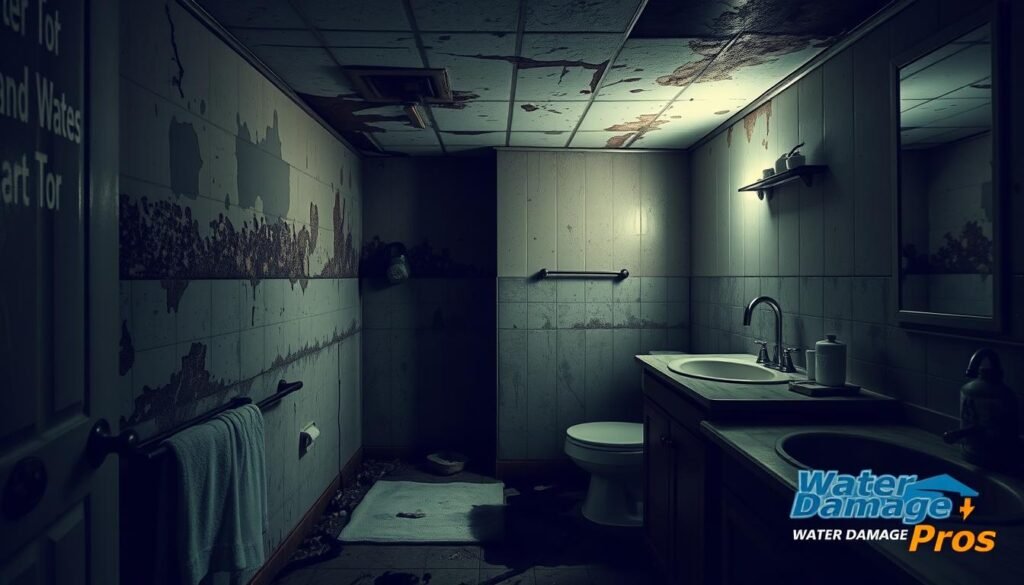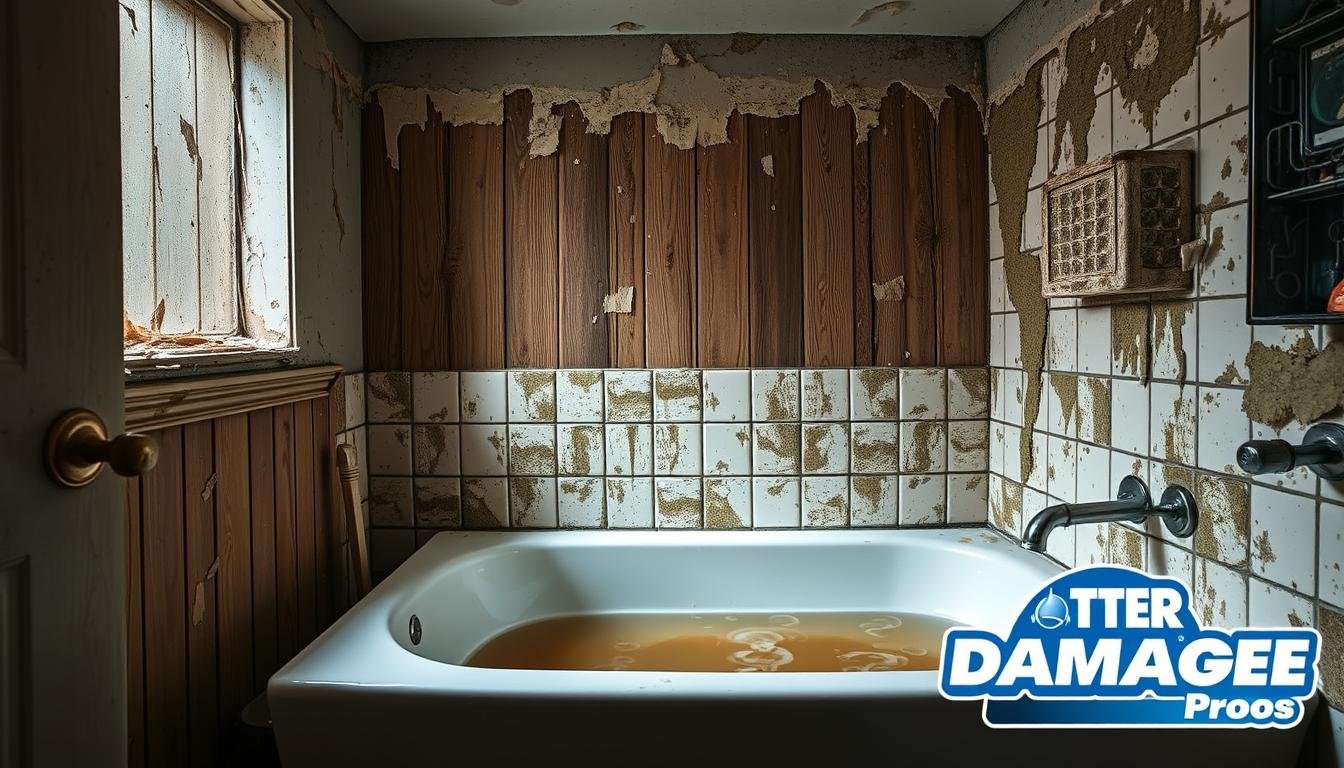Did you know that places with lots of rain get more water damage than dry areas1? Water damage in your bathroom can be a big problem. It can come from a burst pipe, a leaky faucet, or a flooded toilet. Bathrooms are special because they’re always wet from sinks, toilets, showers, and bad air flow12.
Bathrooms use the most water in your home2. This makes them more likely to get water damage. The wet air in bathrooms is perfect for mold and bacteria to grow2. If you don’t fix it fast, it can be very bad for your health.
Key Takeaways
- Bathrooms are prone to water damage due to constant moisture and poor ventilation.
- Bathrooms have the highest water usage compared to other rooms, increasing the risk of water damage.
- Mold and bacteria can grow in the moist bathroom environment, posing health risks.
- Water damage can cause issues like warped floors, discoloration, and odors.
- Addressing water damage quickly is crucial to prevent further damage and health hazards.
Understanding Bathroom Water Damage
Bathrooms are often the first place water damage shows up in homes because they use a lot of water3. They are at high risk of water damage because of this3. If water damage in a bathroom isn’t fixed quickly, it can get much worse3.
Signs of water damage include musty smells, damaged grout, and mold3. These are clear warnings that something is wrong3.
Common Causes of Bathroom Water Damage
Water damage in bathrooms often comes from poor ventilation and condensation3. Leaking or broken pipes are also common causes3. Issues with seals around fixtures can also lead to water damage3.
Steam from poor ventilation can seep into walls and floors, causing damage and mold3. Leaks from pipes can also cause water damage3.
Look out for mold, fungus, and spongy floors as signs of water damage3. Regular checks and proper sealing can help prevent damage3. Good ventilation and minimizing moisture are also key3.
Bathrooms and basements are the most common places for water damage3. Clear water is the most common type, but grey and black water can be more dangerous4. Toilets use a lot of water, so upgrading fixtures can save a lot4.
Mold in bathrooms can cause health problems like asthma4. Insects attracted to moisture can spread diseases4. Water damage services are always ready to help, showing how common these problems are4.

Bathroom Water Damage: Signs and Symptoms
It’s important to know the signs of water damage in your bathroom. These signs can help you catch problems early and avoid expensive fixes5.
Look for peeling, bubbling, or flaking paint on walls and ceilings. Small cracks or big, spiderweb-like cracks are also warning signs. Water rings, mold, sagging ceilings, water stains, musty smells, and soft drywall are other red flags6.
On the floors, watch for buckling, warping, discoloration, cupping, crowning, musty odors, and mold growth. These signs mean water has gotten into the floors. This can cause structural damage, mold, and health risks if not fixed quickly6.
- About 14,000 people in the U.S. face water damage at home every day, with bathrooms being a common spot5.
- Studies show that musty smells in bathrooms often mean water damage. Around 70% of musty smells in bathrooms come from hidden water leaks5.
- Research finds that mold or mildew in bathrooms is common. Over 45% of mold or mildew cases are due to water leaks5.
- Statistics show that water leaks in bathrooms damage walls in about 20% of water damage cases. This highlights the importance of finding hidden pipe leaks5.
- Data shows that bathroom floor damage from water damage happens in over 30% of cases. Real wood floors are especially prone to buckling and staining5.
- Industry research points out that stained ceilings from water damage below bathrooms make up about 10% of all ceiling stains. This shows a clear link between bathroom leaks and ceiling damage5.
If you see any of these signs, call a professional water damage restoration company like Water Damage Pros – San Bernardino. They can assess and fix the problem. Quick action can prevent more damage and health risks.
SERVPRO is a top water damage restoration company with 2,000 franchises in the U.S. and Canada. They offer local support with the resources and training of a big brand6. They are the #1 choice for cleanup and restoration, available 24/7, 365 days a year6.
“Don’t ignore the signs of water damage in your bathroom – it can lead to serious structural issues and health hazards if left unaddressed. Contact a professional water damage restoration company like Water Damage Pros – San Bernardino for a prompt and thorough assessment.”
Knowing the common signs and symptoms of bathroom water damage helps you take action. This protects your home and family’s health.
Conclusion
Water damage in bathrooms can cause serious problems like structural damage and mold growth. It can also lead to health issues if not fixed quickly7. Between 2017 and 2021, water damage was a big reason for home insurance claims, affecting almost 23% of claims7.
It’s important to spot signs like musty smells and mold early. Fixing the cause, like bad ventilation or leaks, helps avoid more damage8. Every day, about 14,000 people in the U.S. file a water damage claim, which is about 1.6% of homes8.
Working with a professional like Water Damage Pros – San Bernardino can help a lot7. One inch of water can damage a home for up to $25,000, so acting fast is crucial7. With the right steps, homeowners can stop water damage before it gets worse, keeping their homes safe and their families healthy.
Knowing the signs and causes of water damage in bathrooms is vital for a safe home7. By being alert and taking action early, homeowners can avoid the expensive and harmful effects of water damage. This keeps their bathrooms and homes in great shape.
FAQ
What are the common causes of bathroom water damage?
What are the signs of bathroom water damage?
How can bathroom water damage be prevented?
What should I do if I suspect bathroom water damage?
How does bathroom water damage differ from other types of water damage?
Source Links
- https://www.badeloftusa.com/ideas/water-damage-signs/
- https://www.ctr-nw.com/blog/how-to-spot-bathroom-water-damage/
- https://advantaclean.com/blog/common-causes-of-water-damage-in-a-bathroom/
- https://www.puroclean.com/blog/how-to-repair-and-prevent-bathroom-water-damage/
- https://www.maxhomenow.com/telltale-signs-of-water-damage-in-your-bathroom/
- https://www.servpro.com/resources/water-damage/what-does-water-damage-look-like
- https://www.thisoldhouse.com/foundations/reviews/water-damage-statistics
- https://krapflegal.com/recources/water-damage/water-damage-statistics-key-insights-and-trends-for-homeowners/


